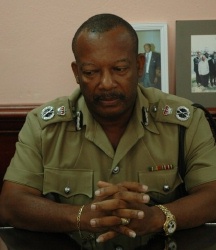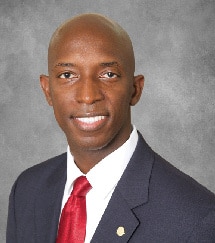St. Kitts and Nevis Police Commissioner attends Caribbean conference
BASSETERRE, St. Kitts – Commissioner of the Royal St. Christopher and Nevis Police Force, Mr. Austin Williams is in St. Thomas, United States Virgin Islands, attending the 25th annual Association of Caribbean Commissioners of Police conference.
The conference which began on Monday, has as its theme “Violent Crime in the Caribbean — Defining and Delivering a Regional Response.”
“We all share similar concerns in terms of open courts, drug interdiction, firearms trafficking and human trafficking,” V.I. Police Commissioner Novelle Francis Jr. is quoted as saying in the Virgin Islands Daily News.
And those concerns are mounting.
Eastern Caribbean Center Director, St. Kitts-born Dr. Frank Mills, a speaker at the conference, quoted a 2007 U.N. report stating that the Caribbean has more murders than any other area of the world.

St. Kitts and Nevis Commissioner of Police, Mr. Austin Williams
Photo by Erasmus Williams
“Crime has invaded the Caribbean region like a cancerous growth,” Mills said, adding that the Caribbean is “caught in the crossfire” of drug-producing countries in central and South America and the drug-consuming U.S. and Canada.
Jamaica’s Deputy Police Commissioner Jevene Benet warned conference participants that small crimes, left unchecked, eventually snowballed to create an “atmosphere of social disorder” in Jamaica, where organized crime flourishes.
“A climate of disorder is like a fertile ground” for violent crimes, she said. She encouraged police departments to adopt a zero-tolerance policy toward law violations such as squatting in abandoned buildings or running stoplights.
Benet pointed to Jamaica’s 2009 homicide rate — 1,680 — as evidence that laws against misdemeanors should be enforced. She said that the country’s annual murder rate did not break 100 until the early 1970s.
“The argument is that such a rise in the number of homicides was aided and abetted by a rise in the climate of disorder, a climate in which little misdemeanors, small infractions that went unchecked, permitted bigger infractions.”
Over the last decade, Jamaica consistently has had one of the highest homicide rates in the Caribbean, but this year, the Virgin Islands’ killings per capita are on-track to outpace Jamaica’s homicide rate.
Jamaica has a population of 2.7 million, and its 2009 homicide rate of 1,680 equals 62 killings for every 100,000 citizens. If the country’s homicides keep up their current pace, 1,618 people will die in Jamaica this year — 60 homicides for every 100,000 people.
As of Monday, 38 people had been killed in the Virgin Islands in 2009, and if homicides continue at their current pace, 96 people will die in 2010 — or 84 killings for every 100,000 Virgin Islanders.
Dr. Olaf Hendricks, a psychiatrist who works with the territory’s violent criminals, said that the only way the Virgin Islands can combat violent crime is by helping families that produce violent criminals.
As examples he pointed to two Virgin Islands families with which he has worked. One was mother with four children — all of whom had been killed in street violence. Another mother of four had three sons who died in homicides and another who was in prison for violent crime.
Hendricks called dysfunctional households “hatcheries of murderers and rapists.”
He told the audience that Saturday while he was writing his speech for the conference, his wife came home and told him about a scene she had just witnessed at a grocery story. A woman was dragging a 2-year-old boy through the store by the arm, beating his head, telling him “I gon’ kill you,” cursing and calling him a thief for pulling a magazine off a rack.
“This little child is already in the murder-making factory,” he said.
Meredith Nielsen, drug policy advisor to Gov. John deJongh Jr., asked the panel at what age should government and non-profit groups try to intervene in children’s lives to keep them from becoming violent adults.
“Zero,” Hendricks answered.
He said that many of his criminal patients face a trifecta of challenges: low intelligence, mental instability and substance abuse. For several of those criminals, their challenges began in-utero.
“Once a child is born with something like fetal alcohol syndrome, you’ve got a lifelong struggle on your hands,” he said. “Once a child comes out of a mother’s body and hears bad words and starts recoiling and gets a bad touch, we’re too late.”
Eleven of the 25 members of the Association of Caribbean Commissioners of Police are attending this year’s meeting, according to V.I. police spokeswoman Melody Rames. Besides the USVI, those participants include the Bahamas; Bermuda; the British Virgin Islands; the Cayman Islands; Curaçao; Guyana; Montserrat; St. Kitts and Nevis; and the Turks and Caicos.
The conference will conclude Thursday afternoon with a press conference announcing inter-island initiatives to combat violent crime, Rames said.

